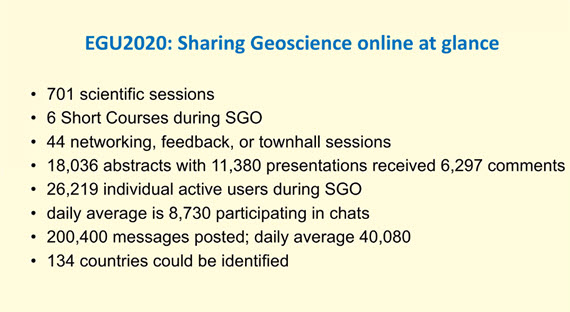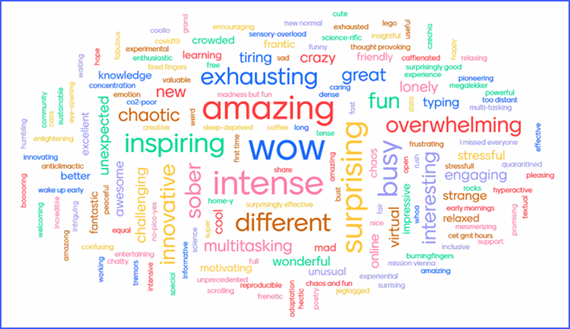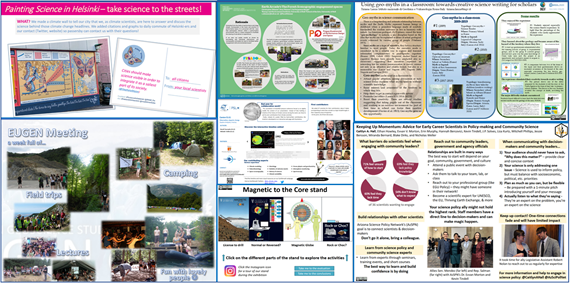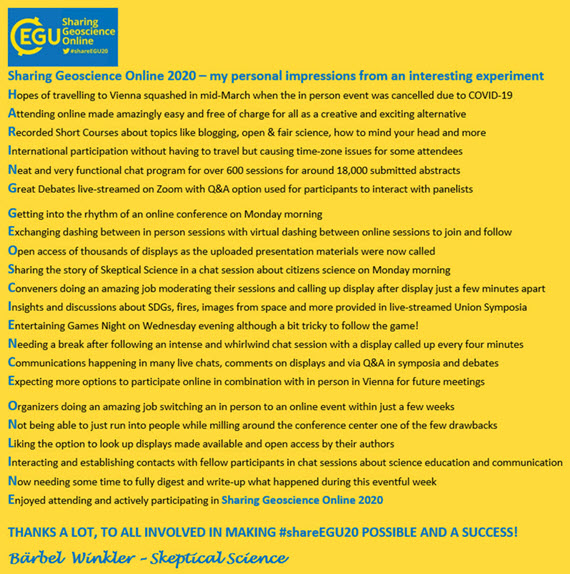EGU2020 - Sharing Geoscience Online - Epilog
Posted on 10 May 2020 by BaerbelW
When it started on Monday May 4, 2020 I didn't really have much of a clue how this year's General Assembly of the European Geosciences Union would work out as Sharing Geoscience Online was one big experiment. Now that it's over, the impressive numbers speak for themselves (I think):

It's really amazing that the event's organizers were able to change course mid-March after the program for the in person event in Vienna had already been finalized. They then only had about 6 weeks to re-shuffle everything, find and set up a typed chat-system, rework the presentation format to allow a display of almost any format to be uploaded with each accepted abstract, make commenting available for the displays, figure out which short courses could be delivered as pre-recorded webinars via YouTube (and actually produce them!), which other sessions could be live-streamed on Zoom and I don't know how many other things! In addition to all that, they also had to put together and share "how-to" instructions of how this completely new and "cobbled together" conference system would work for organizers, conveners and attandees. My prolog post from mid-April provides some details about these preparations.
After participating the whole week and judging from the one-word reactions collected in a word cloud during the virtual EGU party on Friday evening (look for hashtag #shareEGUcelebrate on Twitter), this online conference can be considered a success:
As in previous years, I mostly looked for education and communication related sessions to join in addition to ITS1.8/SSS1.1 focused on citizens science for which John Cook and I had prepared a display about "The Story of Skeptical Science". You can read about this session in an earlier blog post. In addition, I joined several live-streams of Great Debates and Union Symposia and also watched some of the pre-recorded Short Courses. You can check out the videos from the sessions I joined and liked here.
Here is - as a teaser! - the video from Great Debate GDB5 in which "Values versus facts: should geoscience get personal?" was discussed with Stephan Lewandowsky and Laura Smillie (Policy Analyst, Joint Research Centre, EU Commission and Project Leader of the Enlightenment 2.0 initiative) The session focused on what makes people believe fake news and misinformation and the impact that this has, so is quite topical for Skeptical Science.
Some of the chat sessions were pretty intense, especially if displays were called up in short succession like every four minutes as happened in session EOS4.4 "Science to Action: Communication of Science - Practice, Research and Reflection" convended and moderated by Sam Illingworth. The chat-sessions had allocated time slots of 105 minutes each and this time was divided by the number of uploaded displays, which in this case were 23. This left just about 4 minutes time for each display to have the author introduce it and answer perhaps 2 to 3 questions about it. Luckily enough and as already mentioned everybody can comment on the displays directly until May 31 and this feature has been heavily used for this session which included many interesting presentations and projects. Do have a look yourself!
All told, this was really an amazing effort and it paid off! I have a hunch that even though next year's EGU-meeting (planned for April 25 to 30, 2021) can hopefully happen again in Vienna and in person, several elements of this all-virtual event will be kept and put to good use for some form of hybrid conference in the future. This would allow participating without incurring CO2-emissions for travelling to and from Vienna and it could also enhance the on premise meeting by for example utilizing the chat-feature for many sessions.
Here is my personal summary of EGU2020 - Sharing Geoscience Online:
Update: On May 13 2020, the EGU published a blog post summarizing the week of EGU2020: Sharing Geoscience Online - by the numbers.































 Arguments
Arguments

































Comments